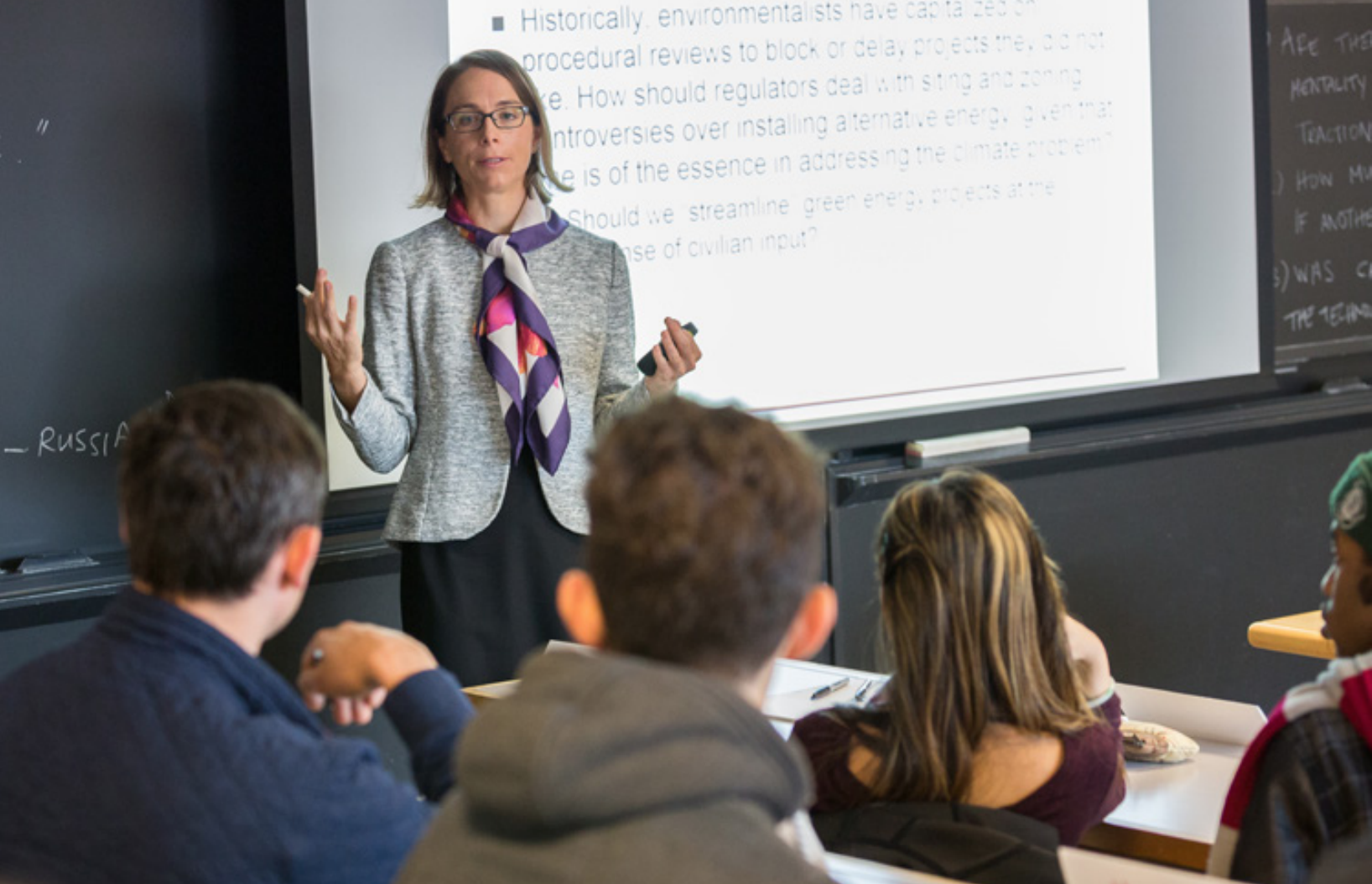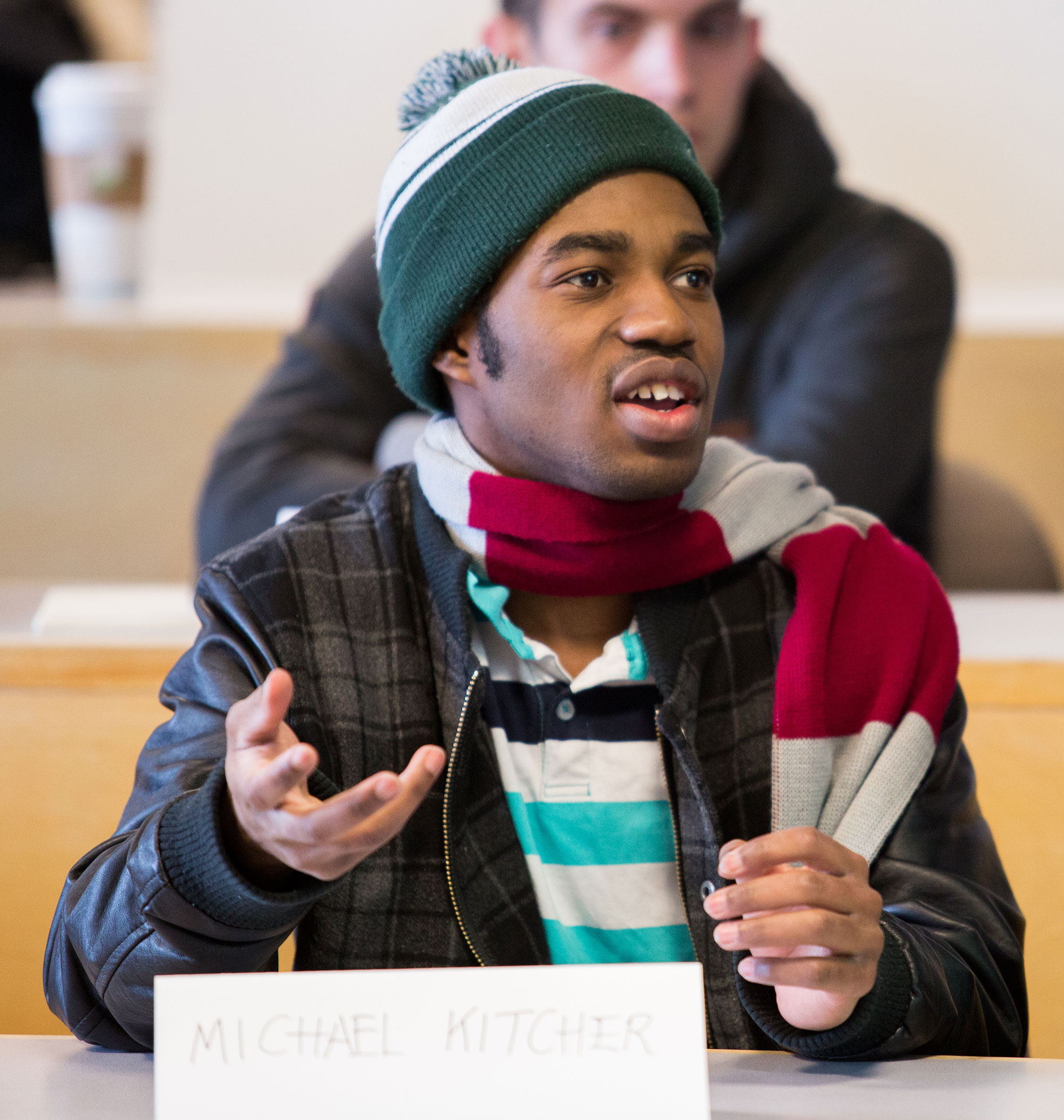
Valerie Karplus SM ’08, PhD ’11 examines energy systems through a variety of lenses. This is, perhaps, unsurprising given her background: She holds undergraduate degrees in biophysics and political science, and graduate degrees in civil and environmental engineering, and in technology, management, and policy.
Now, Karplus, the Class of 1943 Career Development Assistant Professor at the MIT Sloan School of Management, has seized an opportunity to incorporate her portfolio of perspectives into a single new class: Global Energy: Politics, Markets, and Policy. Launched in spring 2018, the class is cross-listed in Economics, Management, Political Science, and Urban Studies and Planning.
“It brings together important themes I’ve nurtured throughout my career,” says Karplus. “The class is a natural outgrowth of who I am.”
The class investigates energy technologies, markets, and governance, employing methods from economics, political science, and sociology to understand past transitions and prospects for a cleaner energy future. Open to both graduate and undergraduate students, it is offered as a social science pillar of the Energy Studies Minor.
“We tackle a lot of topics from an integrated perspective, providing a broad context for how energy systems work in all parts of the world,” Karplus says. “We want students to understand how decision-making is organized, the factors that affect which technologies and solutions can be scaled up to make a difference, and what the barriers and enablers are to developing energy systems, including low-carbon energy solutions.”
Michael Kitcher ’18, a materials science and engineering major and energy studies and applied international studies minor, finds this approach appealing. “It’s important even if you find a good technical solution to be cognizant of problems you might face in the country you’re working in, and to understand how your solution fits in,” he says. Kitcher, who grew up in Ghana, hopes someday to develop sustainable energy technologies for developing countries.

Michael Kitcher ’18, a materials science and engineering major and energy studies and applied international studies minor, contributes to a class discussion on the Cape Wind case. Photo: Kelley Travers
“I was excited about taking Global Energy because it goes into cultural and societal factors behind energy policies, which is something I hadn’t seen offered elsewhere and relates to the research I want to do,” says Max Aidas Vilgalys, a doctoral candidate in social and engineering systems. With an electrical engineering degree from Stanford University, Vilgalys hopes to use technology to encourage individual behaviors that align with lower carbon usage.
Filling a gap in the energy curriculum
The class, funded by an S.D. Bechtel, Jr. Foundation grant, was several years in the making. Karplus, who had just joined the faculty at MIT Sloan, was engaged in research supported by the MIT Energy Initiative investigating how China designed and implemented energy and climate policies. She was eager to teach a class that tapped into her area of expertise: integrated analysis of how technologies, economics, and politics affect energy system performance, tying in ground-level experience as well as top-level policy perspectives. She also wanted to identify a unique niche in both the MIT and energy studies curriculum.
“I wanted to equip undergraduate and graduate students to analyze both the technical and human elements of global energy systems in an integrated way,” says Karplus. “I designed the class to make comparisons across countries and to give students the means to assess the prospects and challenges for energy solutions, especially clean energy solutions, to succeed at scale.”
With political scientist Christopher Warshaw, who has since left MIT for George Washington University, Karplus began to design a class with an interdisciplinary focus on energy development and decision-making by governments and by the private sector. She sought to connect theory and practice through interactive class exercises, such as classroom visits by practitioners and the Climate Interactive “World Climate” negotiation simulation, which confront students with real-world problems and ask them to think through solutions. “I wanted to make potentially distant global energy issues really come alive for students,” says Karplus.
Homework assignments place students in roles where they must identify governance structures shaping a country’s energy flows, provide guidance on policy decisions, and evaluate business decisions to invest in clean energy. One such assignment asks students to write a memo for India’s environmental ministry arguing for or against a carbon tax as the primary instrument for achieving the nation’s pledged level of carbon dioxide emissions. Another asks students to justify locating a new solar photovoltaic construction company in a particular city and country. Graduate students must fulfill more of these assignments than undergraduates.
Karplus hopes to drive home a key point with these exercises: “Human decisions— by individuals as well as groups—often determine the success or failure of what may at first seem to be purely technical solutions to our energy challenges,” she says. MIT students, she notes, “are phenomenal technically,” so it’s “often a big leap for them to understand that even if they have the best machine or most elegant solution, it doesn’t always compete in the marketplace or succeed in having the intended effect at large scale.”
Spanning schools and academic levels
Multidisciplinary analysis is one way to encourage a complex view of energy problems. Another way is to bring together students from different majors and different stages of their education.
“Global Energy is a unique opportunity to enable real cross-pollination across the schools at MIT,” says class teaching assistant Aaron Thom ’11, who is simultaneously pursuing a master’s degree in civil and environmental engineering and an MBA at MIT Sloan. “More than just a cross-listed class, the material has been designed to maximize opportunities for students to work together, particularly across different backgrounds.”
Among the 19 undergraduates (including seven energy studies minors) and nine graduate students enrolled in the inaugural Global Energy class are students concentrating in physics, math, economics, architecture, materials science, management, and urban studies. Undergraduates and graduate students team up for a final project: reporting on the prospects for an energy technology, policy, or practice in a particular market, wielding approaches from the social sciences.
Class assignments are framed to take advantage of academic and experiential diversity. “We want to highlight opposing viewpoints on energy and environmental issues,” says Thom. “We’d like to prepare students to argue successfully for their ideas in the world outside of MIT, where there will likely be less consensus about such issues as combating climate change.”
“I hope students come away from the class with a good dose of reality, humility, and optimism about the magnitude of the challenge in finding solutions to energy and climate problems,” says Karplus. “At the same time, I want to make energy systems more accessible and less intimidating. I also want to help students recognize that by thoughtfully combining technical and social insights, it is possible to accelerate progress and make a lasting impact.”
Notes
In 2017, the Bechtel curriculum development grant supported a team that contributed to developing background material and reading summaries for the class. Two Undergraduate Research Opportunities Program students from Wellesley College, seniors Shaina Ma and Zarina Patwa, worked with Karplus and Melissa Webster MBA ’09, now a lecturer at MIT Sloan, to assemble class material and summarize readings and lecture content as well as test in-class simulations. Bechtel funds also supported Arun Singh SM ’17 and PhD candidate Michael Davidson of the Institute for Data, Systems, and Society to attend global climate talks, generating firsthand observations shared with students during a negotiation exercise using the World Climate simulation developed by Climate Interactive. Early on, former MIT political science professor Christopher Warshaw and graduate student Parrish Bergquist of urban studies and planning also worked to develop materials on the political economy of energy in the United States, which have been incorporated into the first offering. The Global Energy class will be offered again in spring 2019.
This article appears in the Spring 2018 issue of Energy Futures.